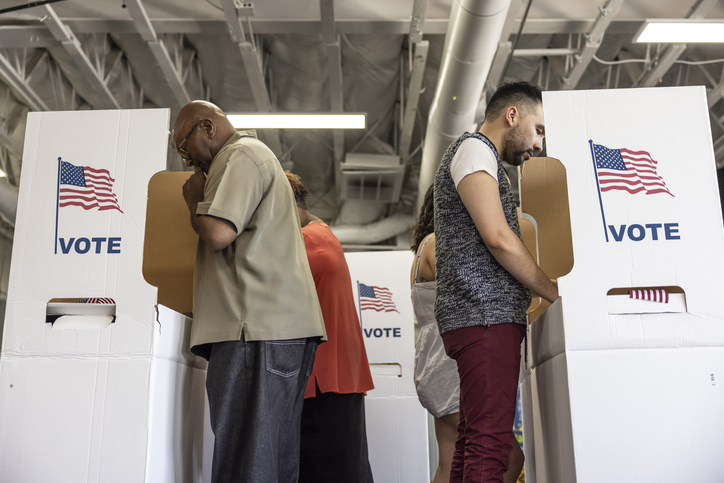As Election Day gets closer, there is a chance your anxiety levels are rising, with the political ads and predictions about the future. You are not alone – research shows elections raise stress and anxiety for many adults.
One 2020 study found 68% of U.S. adults said the presidential election was a major source of stress in their lives. 77% noted the future of the nation itself as a top stressor, and 65% reported feeling very stressed about issues relating to the election.
What is behind these emotions? Often the messages we see during elections lead to irrational thinking. These are the thoughts that CBT identifies as problematic and unhelpful. The role of campaign advertisers is to highlight voter fears and convince them that bad things will happen if the “wrong” candidate is picked. This can increase feelings of stress, anxiety, and panic. It also deepens the divide leading to an us vs. them mindset and has loneliness at all-time highs.
The good news is that we can learn tips to adjust troubled thoughts and emotions. Using CBT tools, millions have gotten past stress, anxiety, depression, and worry. It has been able to help many people navigate life’s challenges.
CBT is not a magic solution, but it does provide tools to avoid getting swept up in unhelpful thoughts. Part of CBT’s power comes from examining our thoughts and relying on facts over predictions. It helps us to understand others’ perspectives and choose actions that do not tend to deepen divides.
Using Learn to Live for CBT Skills
It is understandable and important that people care deeply about elections. When we learn CBT skills and put them into practice, we can build a resilient mindset. This helps us to navigate times of uncertainty. Here are some ideas to keep in mind:
- ANTs: Automatic Negative Thinking Traps (ANTs) are assumptions that can trip us up. They cause us to ignore information or make snap judgments. When we become aware of our ANTs and begin counting them, our thoughts can become more reasonable. These are some important ANTs to keep an eye out for during election season:
- Disaster-making – this is when I decide that something will be not just bad, but so bad that I cannot manage it! I picture myself overwhelmed by the terrible outcome.
- Fortune-telling – this is when I decide that something is going to happen, even if I really do not know that it will.
- Feeling Makes Fact – this is when I am saying this thought is true because I feel it so strongly.
- Labeling – this is when I hand out broad, negative labels to myself or others. When one negative detail is true, I apply a broad label.
- Mind-reading – this is when I assume that I know what people are thinking or why they acted in a specific way. I may picture them judging me or my efforts. I think I know why they did what they did.
- Thought Inspection: Thought Inspection allows us to look at whether a thought is rational or not. This strategy walks you through the evidence supporting your harmful predictions and helps you to create a more realistic way of thinking about the situation. You might have a thought like: “If the other side wins, they are going to strip away all my rights because they are evil.” And Thought Inspection might help you to look at the facts and change that thought to: “While we have some conflicts in core values and priorities, most people on both sides are well-intentioned. People want what is best, we just disagree on the approaches. Writing off half the country as evil is unproductive.”
- Worry Time: Worry Time is where you schedule 15-30 minutes to focus on your worries. You then choose to set them aside at all other times of the day. Worried thoughts about the election can start to rule our day. If you see that happening, try to limit worried thoughts by containing them to a specific time, like 6:30-6:45pm.
- Assertiveness and Boundaries: Just because your friend or uncle wants to discuss the upcoming election, does not mean you have to engage. It is okay to set boundaries about what political topics you will discuss. Maybe change the subject when you dislike where the conversation is going. Remember an easy phrase like “Hey, I’d like to hear how your family is doing.”
- Emotional Flooding: Be aware of the potential for emotional flooding in conversations. Debates with friends and family can quickly intensify emotions, at which point logic goes out the window. Practices like deep breathing, getting exercise, and resting can help you calm your emotions before these discussions. You can use that simple phrase to change the subject before debates become unproductive. You can even walk away for 15 minutes if needed.
Another approach is being aware of media consumption. Consider limiting it to an hour or less each day. We want to be mindful not to over-consume negative political coverage. This can help limit the us vs. them mentality. It also helps to broaden our perspective.
No matter how high the stakes may feel in this election, remember – we are resilient. We do not have to agree on every issue. We can be passionate about our beliefs without pushing away those who think differently. CBT equips us to avoid getting swept up in our worried thoughts and gives us tools to manage this election season.




